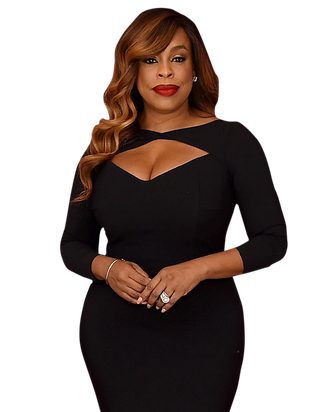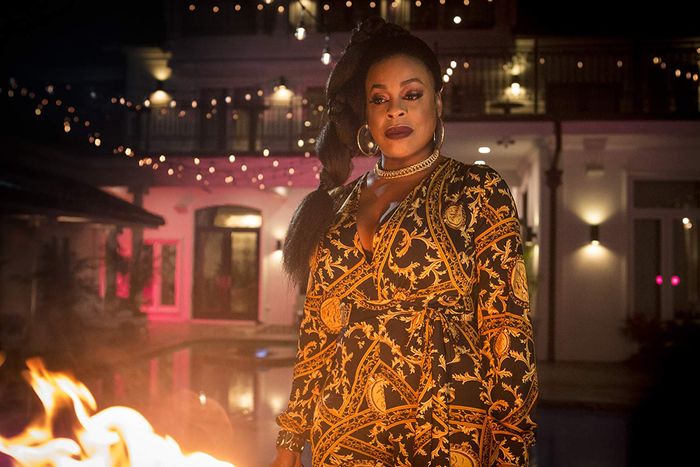
This year we’re thrilled that Niecy Nash is coming to Vulture Festival for a special conversation with Sherri Shepherd about her life and career. Come join us on Sunday November 14 at 8:30pm at the Hollywood Roosevelt in Los Angeles and get to know the person behind the decades of work you know and love. Get your tickets here!
Watching Niecy Nash’s performance as nail-salon owner turned rising queenpin Desna Simms in the third season of Claws has been a tremendous pleasure. A delectable, candy-coated noir full of sequins, glitter, and gold, the TNT drama is rollicking and fantastical, but underneath its gaudy fantasia is a vein of genuine emotion as it explores notions of power, the limits of desire, race, and the price of running from your moral compass in the face of having it all.
Sunday night’s third season finale, “Finna,” leaves the characters, especially Desna, in a precarious place. The crew is able to break out Roller so he can avoid his murder charge and head to Havana, but Desna decides to stay because can’t leave her brother Dean behind. Perhaps even more devastating, Quiet Ann sets the casino on fire, leaving Benedict Liu to die inside. It’s an understandable act of vengeance — especially after Benedict killed Arlene — but it casts doubt on the future of her friendship with Desna. Ahead of the finale, Niecy Nash spoke with Vulture about how she gets into character, the future of Desna’s relationship with Ann, and why Desna is a strip-mall superhero.
When did you know you wanted to be an actor?
I knew I wanted to be an actor when I was 5 years old and I saw the most gorgeous black woman on television. I said to my grandmother, “Who is that?,” and she said, “Baby, that’s Lola Falana.” And I said, “That’s what I want to be, Grandma. I want to be black and fabulous and on TV.”
What has it been like transitioning into more dramatic roles?
Well, I like them both. I had always seen myself being a dramatic actress in my mind, but comedy embraced me so fully and then it was hard to break out of that because the industry only saw me in one way. When I finally was able to turn in a performance in that lane, they were like, “Oh, okay. Maybe you can do this work.” And now I get it so much so that people forgot I can do comedy! [Laughs.]
This season on Claws, you also directed an episode. What attracted you to stepping behind the camera for “Zaddy Was a Rolling Stone”?
I’ve been wanting to direct for years. I thought I was going to end up doing more in the multi-cam world, and it didn’t work out that way. This ended up being my entrance, but I’ve always wanted to do it. How long can you run around in skintight jumpsuits, you know? Well, what you can do is put on some sweatpants and sit behind the camera and yell “Action!”
I wanted to make sure I had another skill set in the bag. You can’t just stay in one particular lane. Try things! I was like, “You know what? I want to write a book.” Try it! “Oh, I want to be a dancing star.” Do I know how to ballroom dance? No, but I’m going to try it! “Oh, a TV-show host, that sounds like fun, let me try it!”
Was there anything about directing that surprised you?
The toughest revelation is the fact that your director’s cut is not the final cut. You’re like, “Oh yes, the studio has to make a cut, the network has to make a cut, but my cut is going to be so great that they’re not going to want to touch it.” And then you see it and it’s a totally different vibe to what you shot. I thought, “Yeah, that won’t be that bad,” and then I was like, “Oh my God, I’m having a heart palpitation.” It’s like they took my baby apart and stitched it back together.
Was there anything you wish audiences got to see?
I wish they got to see the music video between Roller and I as I cut it. To me, it felt richer and fuller. It felt like a ’90s video.
How exactly was it different than what you shot?
It was just a different visual presentation. Whereas I felt like my version told more of a story, that version was more like clips. It goes back to creative license, you know? As a director of television, you turn in as much film as you can — that’s another thing that it taught me. I was never a fan of over-shooting, but now I see why some people do a lot, because they want a lot more choices once they get in the bay. I was thinking, “Why do I need choices if I know what I want?” Because the choices are not just for you. They are for the other people who have to come behind you and do an edit.
This season, we’ve seen Desna’s growing anxiety over the violence in her life, to the point that she’s hallucinating seeing blood on her hands. What do you think this says about Desna and her relationship to power?
The blood on her hands was kind of literal, you know? It was like, “You caused this. You are the linchpin in all of it.” It was a reckoning of being honest with yourself.
Desna also gets called out as being selfish. Quiet Ann actually brings it up at the very end of the finale: “You wanted it all, now you got it.” Do you agree with Ann about that?
I think power corrupts. At first, you are doing a bad thing for a good reason, like what we all watched happen to Walter White — but after he got the power, he became Heisenberg. You are really trying to do a bad thing for a good reason, and then you taste that power and it’s like, “Well, wait a minute. Let me lean in a little harder.”
Desna’s decisions have really affected her friendships, especially with Ann. Do you think that relationship can be mended going forward?
They’ve been through a lot together. I don’t know. I would like to think so. Desna’s constantly saying, “I’m sorry, I’m sorry, I’m sorry,” but will it ever be enough? Can you be sorry enough? I mean, this woman’s wife was killed.
One of the most memorable aspects of Claws is, of course, the costuming. As someone from South Florida who also has family in New Orleans where y’all film, it definitely speaks to me. How does costuming affect your performance and how you approach a character?
I’m a visual person. If I don’t see it, I can’t connect to it. When we had different people at the beginning and they were trying to create this look for Desna, I had a soccer-mom bob with highlights in it, a little motorcycle jacket, a tight pencil skirt, five-inch heels. It felt so false to me, especially at her genesis.
I was like, “Absolutely not. There’s a Walmart down the street. Go get me some denim shorts. And what is this hair doing? She doesn’t have time to do highlights! Her hair just needs to be out, untamed, and free.” I didn’t want to start this woman as, “I’m at a strip mall with my highlights and my soccer-mom bob!” It felt false when I looked in the mirror, and so I couldn’t find her within me until I could visualize her. So the look is everything. And our costume designer Dolores Ybarra is amazing.
Do you have a favorite costume from this season?
The leopard-on-leopard-on-leopard. I had three different leopard prints—a bodysuit, a belt, a skirt, and then a different leopard print on my shoes. It was all leopard, all the things, and that was really fun. I felt like that black-and-white jumpsuit spoke to the duality of the good versus the evil that was happening in that episode. I loved the look I wore when I met my father for the first time and he took us to the museum. It’s hard to pick just one!
You can tell Desna gets confidence from how she dresses.
I feel like she dresses like a strip-mall superhero.
I like that!
If a strip mall had a superhero, her clothing would be the costume. I originally pitched her wearing jumpsuits because I felt like she didn’t live a lifestyle that gave her time to stand in the closet and pick out separates. It was like a grab-and-go, everything is super-matchy-matchy. That was a conscious choice. “Denim dress, denim shoes, denim bag — let’s go. I don’t even have to question whether or not it matches. It’s all denim!”
How did you learn to project such confidence in yourself and in your work?
You have to love yourself where you are. It doesn’t mean that there’s not room for improvement, but even if I want to go from here to there, my “here” has to start with me loving myself. So self-love is the beginning of it, and self-care is how you act on what you feel.
That’s a beautiful way of putting it. You’ve done a lot in your career, including your recent Emmy nomination for When They See Us. What are you hungry to do next?
Next stop on the journey is probably to produce a feature. I want to do a comedy feature. I’m trying to work on putting something together that myself and Chrissy Metz would star in. And after that, I want to do a project with my neighbor … my neighbor is Shaq!



